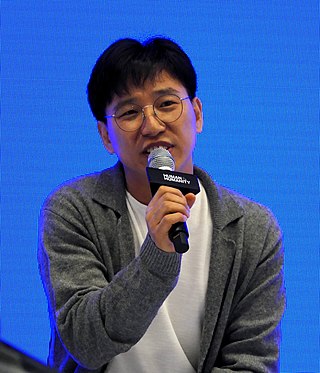Related Research Articles
Kim Suyeong was a Korean poet.
Pak Dujin was a Korean poet. A voluminous writer of nature poetry, Pak Dujin is chiefly notable for the way he turned his subjects into symbols of the newly emerging national situation of Korea in the second half of the 20th century.
Pi Cheon-deuk was a Korean poet and an English literature scholar, but primarily an essayist.
Kim Chae-won is a South Korean author best known for the dreamlike quality of her prose.
Kim Hu-ran is a Korean poet.
Kwak Jae-gu is a South Korean modern poet.
Kim Kyung Ju is a South Korean poet and performance artist.
Kim Eon is a South Korean poet.

Kim Sain or Kim Sa-in is a South Korean poet, literary critic, and professor of creative writing at Dongduk Women's University. Kim has been appointed as the 7th President of the LTI Korea in the Ministry of Culture, Sports, and Tourism of South Korea, which is an Undersecretary-level position.
Kim Namjo is a Korean poet.
Na Huideok is a South Korean poet.
Mah Chonggi is a Korean poet.
Jang Jeongil is a South Korean poet, playwright, and novelist.
Yi Seongbok is a South Korean poet known for his imaginative and multi-layered poetry.

Shin Yong-Mok is a South Korean poet.
Kwang-lim Kim is an early-modern South Korean poet.
Kim Yongtaek (Korean: 김용택) is a South Korean poet.
Lee Garim is a South Korean writer.
Lee Jangwook is a South Korean poet, novelist, and critic.

Jang Seoknam is a South Korean poet.
References
- ↑ 지울수없는노래, OCLC 10532743
- ↑ "김정환" biographical PDF available at: http://klti.or.kr/ke_04_03_011.do# Archived 2013-09-21 at the Wayback Machine
- ↑ Book Asia: http://www.bookasia.org/bbs/view.php?id=author_e&no=43
- ↑ "김정완 " biographical PDF available at: http://klti.or.kr/ke_04_03_011.do# Archived 2013-09-21 at the Wayback Machine
- ↑ "김정환" in the Korean Author’s Database at LTI Korea: http://klti.or.kr/ke_04_03_011.do# Archived 2013-09-21 at the Wayback Machine
- ↑ "김정환" in the Korean Author’s Database at LTI Korea: http://klti.or.kr/ke_04_03_011.do# Archived 2013-09-21 at the Wayback Machine
- ↑ "김정환" in the Korean Author’s Database at LTI Korea: http://klti.or.kr/ke_04_03_011.do# Archived 2013-09-21 at the Wayback Machine